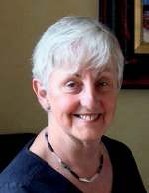The Big Question
This month’s question is: ‘What has the Scottish Parliament meant to you?’

Dr Alison Elliot, Hon Fellow School of Divinity, Edinburgh University and Moderator of the General Assembly in 2004 to 2005.
“Recently, Eurodiaconia held its AGM in Edinburgh, bringing together people from right across Europe who run the care homes, homelessness projects and drug abuse services that the churches provide for people in need.
“As part of their programme, they held a reception in the Scottish Parliament, hosted by MSPs and attended by a range of guests. This kind of hospitality happens most evenings in the Parliament and provides the background buzz against which our politicians do their work, reminding them of the causes, the good work and the questions that people care about who are not, themselves, politicians. “Embedding the Parliament’s work in these wider concerns of society was one of the hopes people had for the Scottish Parliament and in this it has been successful. Along with that has gone better access to MSPs and Government, partly because they are on our doorstep but also because of a better culture of listening than had been the case with Westminster. MSPs often pop up at events across the country too. Less successful have been attempts to change the culture of the chamber. Aping Westminster, First Minister’s Questions is an opportunity for MSPs to play to the gallery and to act up for the attention of journalists who prefer to report game-playing than good debate.
“Bringing Parliament closer to us has been a success. We have a better idea of the detailed work Government does and they have a better chance to listen to what we have to say.”

The Rev Robert Allan, minister at Falkirk, Trinity
“I’m not particularly party political, I like to think I could question any party on their stance. The trouble is when you do question, often people wrongly presume you support an opposing party.
“My questioning comes from my faith beliefs. It was once thought that the General Assembly of our Church was a voice for Scotland in the absence of any political structure. How roles have reversed. As the General Assembly has almost faded to insignificance, so the Scottish Parliament and its MSPs have featured regularly on our news.
“The Scottish Parliament, whatever your political views, has become a voice for Scotland, bringing politics closer to home; we feel as if we have some say albeit that say is limited in many ways.
“The fact that I and others have been invited to lead Time for Reflection at the Parliament shows at least a measure of desire to have some positive thought that influences MSPs before they enter the debating fray.
“The Scottish Parliament now reflects modern Scotland in all its diversity and I believe it is now a vehicle which we can all use, through our local MSPs, to talk about issues that affect Scotland and try to build a nation of which we can all be proud. “As Christians we surely want to build a better world, guided by the values of God’s Kingdom, so perhaps we can bring those values to the fore and work alongside our politicians to create a better and fairer society and world for all.”

The Rev Sang Cha, minister at Alloa: St Mungo’s
“1999 proved a pivotal year in which the Scottish people ventured into the unknown. At that time, a devolved government was seen by some as an idea too radical and too disruptive. But it was Winston Churchill who once said: ‘Courage is rightly considered the foremost of the virtues, for upon it all others depend.’
“Twenty years on, the Scottish Parliament still remains a profile in courage. It is proof that yesterday’s radicalism and today’s disruptions can become tomorrow’s common sense. Deep down, it remains a body of people who have an intrinsic sense of fair play and responsiveness for the common good.
“The courage and resilience of the Scottish Parliament may prove instructive for the Church of Scotland as we too undergo a sea of change and venture forth into the unknown.
“The Church of Scotland may not be what it used to be in its glory days, but we understand that our Church is not yet what it might be in 2019 and beyond. We will need courage.
“I hope you share with me a deep passion for imagining what our church can be – a Church that can interpret our communities’ unarticulated yearnings and unrecognised needs and give them a concrete place of welcome, safety and friendship within and without our church buildings.
“We will soon be engulfed in a riot of cherry blossoms. As I always say: ‘Something good is just about to happen.’”

The Very Rev Dr Alan McDonald, Moderator of the General Assembly in 2006 to 2007.
“When I think back to all the talented individuals who worked so hard to bring the Scottish Parliament to life, I am very proud indeed to remember the many people from the Churches in Scotland who were at the very heart of the process, and without whom the Parliament would surely not have been delivered.
“I seem to remember some discussion about whether to have a regular act of worship at the beginning of the proceedings in the new Parliament. A format was agreed that was dignified, and different from the Westminster model, and all was well. “I was delighted to be invited to present Time For Reflection on two occasions. The first was as a parish minister from St Andrews, speaking about Andrew our Patron Saint.
“The second was when I was the Moderator of the General Assembly, and just back from a visit to our sister churches in Ghana, and I spoke about the 200th anniversary of the abolition of the Slave Trade Act.
“Finally, as a supporter of the Scottish Parliament, I believe there is something that might make its decisions even better. At present, I think it lacks a Second Chamber. I have no problem with the Committee system. I simply believe that also having a Second Chamber could sometimes make the Parliament’s decisions better.
“At this important anniversary, we should unite in wishing our young Parliament well. And may it go from strength to strength.”

Chloe Clemmons, Scottish Churches Parliamentary Officer, Holyrood
“In the week of writing, the Church of Scotland has played host to the Eurodiaconia Annual Meeting. As part of the three-day event I organised a Parliamentary Reception, something I have done many times before. This group is different – over 100 delegates working in social care have travelled from all over Europe and they are excited by our Parliament. “They are surprised by how accessible the building is and appreciative of the warm welcome they receive from MSPs and from the Cabinet Secretary for Communities and Local Government who has come to speak.
“Once the formal part of the evening is over some of the group are taken on an ad hoc tour of the Debating Chamber – as they laugh and take selfies I am reminded that our Parliament is something special. It is a place where people are welcome on equal terms with elected representatives.
“Of course, the Parliament is not always so relaxed. To arrive on a busy weekday morning to give evidence to a Parliamentary Committee as part of the formal scrutiny of legislation is a nail-biting experience. This is particularly true when you know that the proceedings are genuinely transparent – there is a public gallery in every Committee Room and meetings are live streamed for anyone who cannot attend in person. For me, that awareness of being in the public gaze is a rare experience.
“For Parliamentarians it is their daily commitment to being accountable and I am grateful for it.”